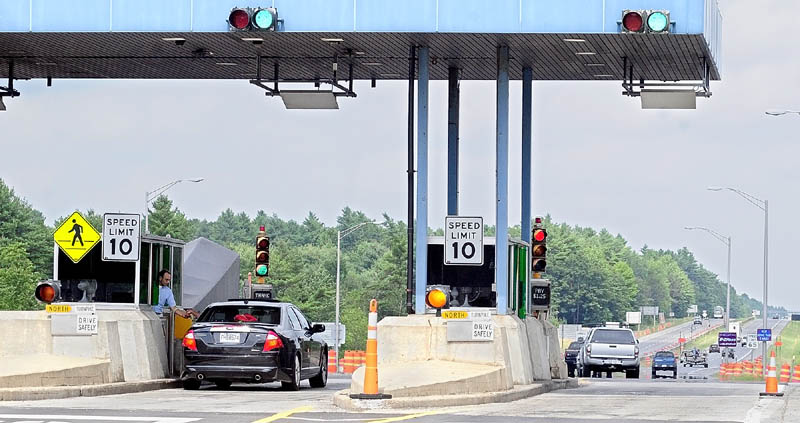PORTLAND – The cost of driving through the York tollbooth on the Maine Turnpike is about to jump from $2 to $3 for cash customers.
It’s one of several toll increases that got tentative approval Thursday from the Maine Turnpike Authority’s board of directors.
Fees at some turnpike tollbooths are set to go up 50 cents on Nov. 1. Tolls also would increase for E-ZPass customers, who would pay $6.20 to drive the 100 miles from York to Augusta, compared with $4.80 now.
Truckers could feel even more of a bite, with the cash price going from $20 to $29.75 for the same distance.
The toll hikes are designed to raise $21 million a year to fill a gap between the turnpike authority’s increase in bond payments for past and planned highway projects and a decrease in toll revenue caused by reduced traffic.
Board members, who voted 5-2 in favor of the proposal and are scheduled to hold a final vote Aug. 16, said they can’t devise a proposal that will satisfy all customers.
“I recognize all this is about that elusive concept of equity,” said James Cloutier, a Cumberland County representative on the seven-member board who advocated for the proposal.
The turnpike authority announced two months ago that it had to increase tolls to meet its obligations to bondholders. The turnpike’s only revenue source is tolls — now totaling about $100 million a year — which it uses for operations and to pay off bonds on long-term debt.
The authority held six public hearings across the state to gather comments on a range of toll-hike scenarios.
Board Chairman Daniel Wathen said the authority sought to minimize the overall increase and make it as fair as possible.
“I think it’s been a very open process where every bit of the discussion among the board has taken place right here,” he said, referring to the board’s well-attended public meetings.
The most contentious part of Thursday’s plan was the tolls for commercial trucks.
Tractor-trailers are now charged four times the rate of cars. The plan approved Thursday would increase that to 4.25 times the car rate.
That was one reason board member Bruce Van Note, who represents the Maine Department of Transportation, voted against the plan.
“(Fuel) taxes and tolls on trucking is double taxation,” Van Note said.
“You’re shifting it to the shelf,” he said, suggesting that trucking companies will pass on higher toll costs in the form of higher-priced products.
He said business owners claim that Maine already is at a competitive disadvantage because of the cost to truck goods in and out of the state.
Van Note said even if E-ZPass rates climbed to 8 cents a mile — an idea in a staff-recommended plan that would not change the rate for trucks compared with cars — the turnpike would remain one of the nation’s least expensive toll roads.
The plan approved Thursday may generate as much as $700,000 more than is needed to repay the bonds. Wathen and York County board member Diane Doyle said that if a staff analysis confirms that before the Aug. 16 meeting, the difference should be used to offset some of the increase for trucks.
With volume discounts and a modest increase in the per-mile E-ZPass rate, truckers with Maine E-ZPass won’t necessarily pay any more under the approved plan than they would under scenarios that kept the truck rate at four times the car rate, Wathen said.
Peter Mills, the authority’s executive director, said tolls for trucks are an important economic issue for the Lewiston-Auburn area, where many businesses depend on trucking.
Brian Parke, president of the Maine Motor Transport Association, said not all truckers will be able to pass the increase on to shippers immediately because some contracts are fixed.
He said that if tolls climb too high, some truckers will avoid them by using secondary roads. “Our preference is to put commercial traffic on the road best designed for them,” he said.
Board member Robert Stone, representing Androscoggin County, advocated a more radical change: eliminating bulk discounts for E-ZPass users and eliminating minimum tolls. A user driving one mile would pay for just one mile — which now costs slightly less than 7 cents.
He also proposed raising cash prices to reflect the true cost of staffing the tollbooths, which might cause a sharper jump in tolls.
“This is really one of our last chances to get equity right for a while,” Stone said. “I don’t want to be in a position where we exacerbate inequity.”
But his proposal was too radical for the board so late in its deliberations.
“This proposal puts us back to square one in the ninth inning,” said John Dority, a board member representing Cumberland County.
The plan approved Thursday would keep the minimum tolls — paid by E-ZPass users — at 50 cents, rather than raising them to 60 cents as the staff recommended.
It also would limit the increase in the average per-mile charge for E-ZPass users to 10 percent instead of 20 percent, making the per-mile charge 7.4 cents.
Tolls to enter the turnpike in places including Biddeford and Falmouth would remain $1.
E-ZPass users who make 20 to 30 trips per month would get a 10 percent discount. Those who make 50 to 60 trips would get a 40 percent discount.
Per mile, E-ZPass tolls are lower than the cash price for any stretch of the highway.
The bulk discounts are good for commuters and push people to use the E-ZPass, which saves the turnpike money and has so far enabled it to reduce its work force from 900 to 400, Mills said.
Staff Writer David Hench can be contacted at 791-6327 or at:
dhench@pressherald.com
Send questions/comments to the editors.



Comments are no longer available on this story